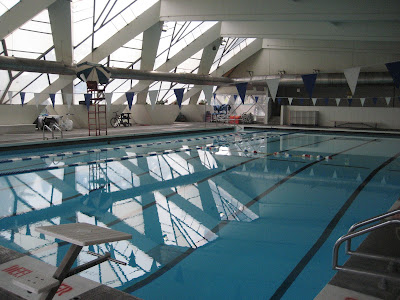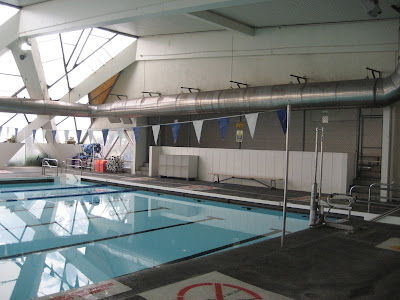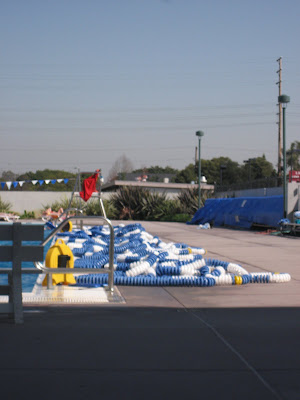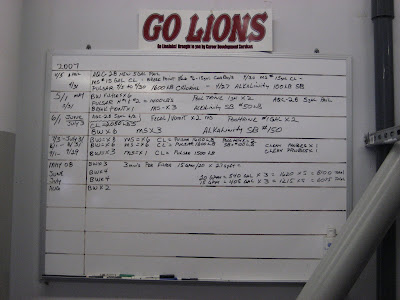Me: What are your thoughts on swim lessons? Having been around a pool my whole life in one way or another, I can't imagine what it would feel like to not be able to swim. Do you think it's important for parents to teach their kids how to swim as a basic life skill?
Lakeshia: In regards to swimming I think that it's a wonderful way to stay active and exercise your whole body while having fun at the same time. From the time that I was a baby throughout the majority of my preteen years I was around swimming because my dad loves to swim. But now I haven't been swimming like I used to in a while. I think that it's good for parents to get their children swim lessons because it might come in handy one day. Also the lessons teach them not to be scared of the water and how to stay active and healthy while having fun. Swimming at an early age can be beneficial because it can help them acquire skills for a sport that they may pursue. What r your thoughts and how did you first start swimming?
Me: I totally agree. I've been swimming for as long as I can remember, my mom took me to Parent/Child classes when I was a baby and I've been swimming ever since. Now I've been teaching kids how to swim for almost 7 years, so it's hard for me to understand how some kids just never learn how to swim or why some parents never think to take their kid to swim lessons. Every kid doesn't have to end up on the swim team but just to know how to swim for safety reasons is so important. The hardest, but also the most rewarding, swim lesson I ever had was a 14 year old girl who never learned how to swim. She was petrified to be anywhere but in the shallow end where she could stand. I've had 4 year olds in my lessons that were so unafraid that they would jump in without thinking or realizing that they can't actually swim yet, and to see a girl in high school be so afraid of going in the pool was a crazy experience. It took me all summer, but eventually she learned how to swim a whole lap without stopping. It certainly wasn't pretty, but just the fact that she was able to keep herself afloat and be confident in the pool was astounding and made me feel great as a swim teacher to know I helped her overcome that. Like you mentioned, not being scared of the water is probably the most important thing for anyone at any age learning how to swim. Another reason it's so important to learn to swim is because it's such a common thing to spend time at the pool during the summer, for birthday parties, with family, etc. Especially being in So Cal I feel like everyone had at least a neighborhood pool that they went to for fun. Do you have any stories of you or your family related to swimming/the pool?
Lakeshia: Yea I totally agree with you that knowing how to swim is also for safety reasons. Congrats on teaching the girl how to swim and helping her overcome her fear. My mom says that when we were younger my dad used to take us in the pool with him all the time. What I remember most is the weekends during summer that me and my sis spent with my dad and we used to swim and have BBQs. Does your family swim a lot or just you?
Me: Thanks! Yeah i remember doing that a lot during the summer too. We had a neighborhood pool across the street from my house and i think I spent almost everyday of the summer there. My brother and I would spend hours there with the other neighborhood kids and our parents. I’m pretty sure my parents just got us into swimming as a basic safety skill, but both my brother and I ended up swimming competitively and playing water polo. My parents played sports growing up but neither of them was an amazing athlete or ever got into swimming. They know how to swim but they aren't very good. Did u play any sports growing up?
Lakeshia: Oh ok that's cool that both of you went on to compete. I was never the major athlete type. When I was younger I did tap dance and ballet and then I cheered my freshman year in high school but that's it. Is swimming the only sport that u did?
Me: That's cool. I danced when I was little but I stopped when I started playing soccer. I played a bunch of sports throughout my life. I played soccer for about 7 years and then basketball, and swimming off and on my whole life. I stated playing water polo when I got to high school and that became my sport, so I swam and played water polo in high school and then played polo here up until last semester. If u could've gone back and played a sport or done a different activity, would u?
Lakeshia: Oh ok...so you're very versatile in your sports. Ummm I don't think that I would have played any other sports because I'm not the athletic type but I probably would’ve kept dancing because I loved doing that. Why did you stop playing water polo here?
Me: Yeah I always was playing a sport growing up but water polo was my favorite. I had to stop playing last semester because I needed to get prepared for graduation, do internships, and get myself financially self sufficient by the time May rolled around. Why did u stop dancing?
Lakeshia: Ok I definitely understand because graduation is like tomorrow.lol I stopped dancing because we moved and there really wasn't a big dance program at my new elementary school or the park near by.
Me: Yeah we're so close to graduating, its crazy! It wasn't an easy decision though; to have to give up something you love doing. But it was definitely the best decision in the long run. I miss it a lot. What things do you think you will miss the most about LMU?
Lakeshia: Yea we really are. Although you had to give it up, at least you'll always be able to swim. I think I’m going to miss being in one place with all of my friends and knowing where everything is on campus as opposed to having to start all over. Besides water polo, what else are you going to miss?
Me: That's true. It will never be the same as being on the team, but at least I can continue to play polo and swim on my own. Yeah I think I'll miss the same kind of things, and I'll miss the fun atmosphere of just being in college with all of the friends that I've made here. It really went by too fast.
Lakeshia: Yea it did. I always heard people say enjoy it because it'll be gone before we know it but I didn't think it would be this fast. I guess it's time to start a new chapter in our lives.
Farewell to Racked Los Angeles
9 years ago







